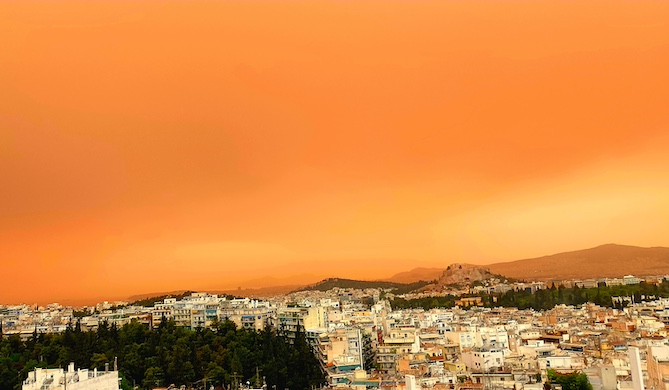

May Day in much of Europe is traditionally a Labor Day of sorts, but instead of a holiday with barbecues and good cheer, the date signifies when many public and private sector employees go on strike. In France multitudes of them, led by powerful union leaders, will be taking to the streets. Across Italy, too, where a common refrain in the press is to reinforce the political value of the struggle over wages, strikes were expected.
In Greece, tourists hoping to make an early springtime dash for Mykonos or Santorini will find themselves stuck at Piraeus, a general strike leaving ferries tied up in the port.
Yet May 1 marks something else in Europe’s southernmost country: The official start of fire season.
Dozens of fires have already been put out over the past month after temperatures began hitting 86 degrees Fahrenheit in late March — considerably higher than previous spikes recorded over the past decade.
This year, Greece is doubling the number of firefighters in specialized units to some 1,300, and adopting American techniques to try to outflank fires, with airborne units scrambled to build breaks in the predicted path of the flames.
As a regional fire chief, Ioannis Kolovos, told the Associated Press, “It’s actually already summer for us. The truth is that the fire season has started prematurely and has been extended over the last five years.”
With that in mind, fire crew members include forestry experts and firefighters with varied skills, many developed in training with colleagues in America, France, and Spain.
Fires burned an estimated 675 square miles of Greek landscape last year, including a blaze in northern Greece that was the worst fire ever recorded in the European Union. Windy and mountainous with hard-to-reach islands, Greece faces a daunting annual challenge in defending multiple urban settlements that overlap with wooded areas at wildfire risk.
One such area that is relatively close to the capital is the seaside town of Mati, scene of the deadliest wildfire in the country’s history. Memories of the 2018 inferno, in which more than 100 people perished, are painfully fresh.
On Monday, a Greek court convicted five former firefighting and disaster response officials connected to the fire. The officials, including a former fire chief, received sentences of between 15 and 111 years for multiple counts of criminal negligence resulting in injury and loss of life. Survivors were outraged, though, when the presiding judge allowed them to pay fines in lieu of serving their sentences.
More than 1,500 homes and structures were destroyed in the fire, along with some 300 cars. The panel of three judges ruled that the response, including a large sea evacuation, was poorly coordinated.
By reinforcing firefighting resources and improving the coordination of disaster relief across multiple departments, the current Greek government seems determined to avoid a repeat of the 2018 Mati fire and attendant political fallout.
Even if funding and international cooperation is on Greece’s side, though, nature is not. It is getting hotter earlier and more often. Last winter was the warmest since modern records began in 1960, according to the National Observatory of Athens, which analyzed European Union satellite data. The six warmest Greek winters on record have occurred in the past decade.
Worse, new data indicate that Europe is the world’s fastest-warming continent, its temperatures rising at roughly twice the global average. A dust storm earlier this month that blanketed much of Greece in an otherworldly orange haze of African dust mesmerized tourists but reminded Greeks of the envelope of ash from area fires that have become a chronic feature of Athenian skies in recent summers.
Standing in the main disaster response command center at Athens this week, Vassilis Kikilias, the minister for climate crisis and civil protection, and a former tourism minister, says authorities expect annual conditions to worsen further. “We had a dry winter and fall temperatures lasting until December,” Mr. Kikilias stated, adding, “It will be a very difficult fire season, a very difficult summer.”
Spain and Portugal have their own problems battling fires, too.
Across a wide periphery of the Continent, it seems, even after the May Day battle cries of the strikers recede, the heat will be on.













